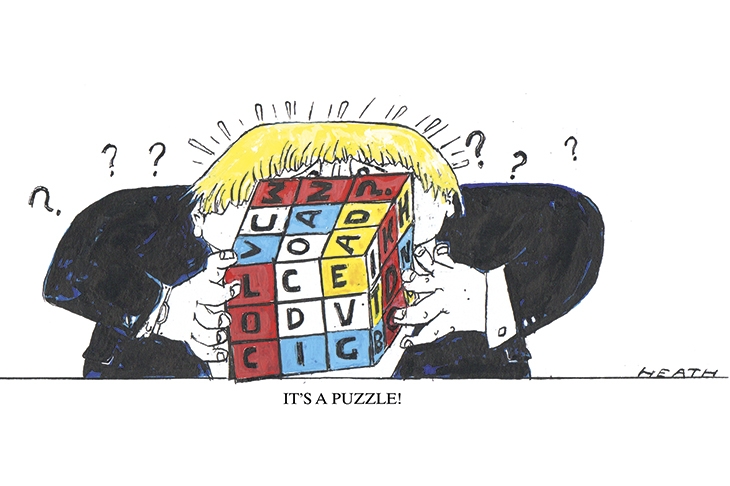Home
More than a quarter of the population of the United Kingdom (three-fifths of the Welsh, a third of the Scots and two-thirds of those in northern England) were put under harsher coronavirus restrictions. Boris Johnson, the Prime Minister, amid a flurry of local lockdowns, found himself unable to state the coronavirus restrictions suddenly imposed on the north-east. He said ‘six in a home, six in hospitality’ could meet, though the law said that members of different households could not meet at all indoors. Universal laws, brought in by statutory instruments, prohibited eating or drinking in bars, restaurants or clubs after 10 p.m. In cities such as York and Liverpool, people thronged the street after closing time, dancing and drinking from bottles; others fetched more from supermarkets. Police in Scotland broke up more than 300 house parties over the weekend. The Houses of Parliament said it would not serve alcohol after 10 p.m., even though its outlets counted as ‘workplace canteens’. Fines of up to £10,000 could be imposed by fixed penalty notices, without trial. Police were told not to install the new NHS Covid-19 app on their work smartphones. A bone-eating vulture, Gypaetus barbatus, was spotted in Norfolk.
At the beginning of the week, Sunday 27 September, total deaths (within 28 days of testing positive for the coronavirus) stood at 41,971, of whom 212 had died in the past week, compared with 136 the week before. New cases detected reached 7,143 in a day. Sir Graham Brady, chairman of the 1922 Committee of Conservative backbenchers, was ready to defeat the government if it would not give MPs votes on coronavirus laws. After 127 students at Manchester Metropolitan University were found to have coronavirus, 1,700 were sent to their rooms for 14 days’ quarantine. Rishi Sunak, the Chancellor of the Exchequer, brought in a new Job Support Scheme, in place of furlough, open from the end of October, so that employees who worked at least 33 per cent of their former hours could receive 77 per cent of their former wages. Mr Sunak said the support was intended for ‘jobs that have a genuine prospect of being viable’. The reduction of VAT for hospitality businesses from 20 per cent to 5 per cent was extended until 31 March. Caesars Entertainment, the Las Vegas casino owner, agreed to buy the bookmakers William Hill for £2.9 billion. Mohsin and Zuber Issa, the billionaires from Blackburn, looked hungrily at Asda.
Sergeant Matiu Ratana, 54, was shot dead at a police station in Croydon. A man suspected of the shooting was critically wounded by a shot from the same gun, although he had his hands handcuffed behind him. Uber, the minicab-hailing network, was given the right to continue operating in London by Westminster Magistrates’ Court. A storm covered cars and gardens in Walcott, Norfolk, with sand.
Abroad
The total number in the world who had died with coronavirus reached 998,285 by the beginning of the week and later exceeded a million. In Spain the health minister quarrelled with the authorities in Madrid, calling for stricter regulations. Tunisia, experiencing a rise in cases, decreed that nightclub windows must be kept open. The Swiss rejected an end to their agreement with the EU that allows the free movement of people, by a vote of more than 61 per cent. Bus Éireann is to end its Dublin to Belfast service, not out of health fears but because it has no money to spare for it.
The New York Times reported that President Donald Trump of the United States paid only $750 in federal income tax in 2016, the year he ran for the presidency, and in 2017, his first in the White House. Mr Trump nominated Amy Coney Barrett, a socially conservative judge, to fill the vacancy at the Supreme Court. Spain’s supreme court upheld a decision to ban Quim Torra, the Catalan separatist leader, from public office for refusing to take down an independence symbol from a government building before last year’s elections.
Dozens were killed in renewed fighting between Armenia and Azerbaijan over Nagorno-Karabakh; Armenia said one of its fighter jets was shot down by a Turkish jet. Lebanon’s prime minister designate, Mustapha Adib, resigned after abandoning efforts to form a new government. The Australian Strategic Policy Institute said that China had been building more detention centres for its Uighur minority, bringing the total to 380 — 100 more than previously thought. CSH






Comments